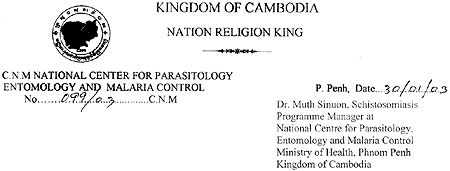| (拡大画面:19KB) |

|
Hosting Country: Japan
Purpose: Laboratory practice on schistosomiasis diagnosis and operational research methods at Department of Tropical Medicine and Parasitology, Dokkyo University School of Medicine.
Duration: From September 20th to 08th November, 2002 (7 weeks)
Sponsoring Agency: Sasakawa Memorial Health Foundation
Highlights of the training:
1. Laboratory maintenance of Schistosoma mekongi for the life cycle and related studies
1) Morphology-based identification of parasite (eggs, miracidium, cercaria, male and female adult worms) and its intermediate host snail, Neotricula aperta (beta and gamma-race)
2) Infection of miracidia to intermediate host snails
3) infection of cercariae to experimental final hosts (mice)
4) Snail sampling and collection method
5) Determination of infection rate in snail population for epidemiological assessment, potential on-going transmission
6) Pathologic observation of S. mekongi infected mice with emphasis on egg-derived histopathology in the liver and intestines at different infectious periods
7) Recovery of parasite materials including eggs and adult worms from the infected mice
8) Animal reservoir, general knowledge: stool examination of S. mekongi infected dogs employing a kind of Formalin-Detergent Technique.
2. Immunodiagnosis of Schistosomiasis mekongi
1) Enzyme-linked immunosorbent assay (ELISA)
a) Large scale recovery of parasite eggs from organs of S. mekongi-infected mice by digestion method
b) Preparation and purification of soluble egg antigen (SEA) from isolated the parasite eggs
c) ELISA using SEA and serum samples from human patients and experimentally infected animals
d) Biochemical and immunological analysis of SDS-PAGE, 2-dimentional electrophoresis, and immunoblotting ect.
2) Circum Oval Precipitin (COP) test
a) Preparation of S. mekongi-egg antigen for COP test
b) Examination of COP test using serum samples from human patients and experimentally infected animals
3. Statistical methods for data analysis and assessment of specificity and sensitivity of a diagnosis tool
4. Interpretation of the results of the serology diagnosis from Schistosomiasis patients and controls of Cambodia, Phillipines, China and Japan
1) Ultrasonography, general knowledge demonstrated by Dr. Tamano at Dokkyo University Hospital. I observed 13 patients who have concerned with abdominal pain and the doctor checked liver, goal bladder and duets, spleen and splenic vein, pancreas, and kidneys.
2) Others
a) Experimental chemotherapy: examination of effects of Praziquantel againt eggs and adult worms of schistosomes both in vivo treatment for mice and in vitro
b) Attended the 8th Forum Cheju Japan-Korea at Otawa Club, Maebashi, Japan about New Challenge to Parasite Immunology. This seminar is very importance because the parasitologists presented new information of diagnostic skills and treatment through their reseach.
c) Visited to JICHI medical school together with Prof. Matsuda. Prof. Akira Ishii, chief department of medical zoology showed us the experiences of parasitology control such as Schjstosomiasisjaponicum in Japan and Schistosomiasis haematobium in Africa.
d) Attended the Parasitology meeting at Niigata Prefecture together with Prof, Hajime Matsuda, Dr. Yuichi Chigusa, Dr. Masashi Kirinoki and Dr.Jun Matsumoto. I learnt the new research methods such as transmission of Schistosomiasis as well as other researches on different parasitological diseases.
e) Collected Oncomelania snail in Kofu and visited Yamanshi Institute for Public Health, Mr, Noriaki Kajihara gave presentation on Schistosomiasis Strategy Control Programme in Japan and he guided us to see the actual site of schistosomiasis endemic areas.
f) Visited SMHF with Dr. Yuichi Chigusa and I presented the Schisosomiasis Control Activities in Cambodia and discuss the work plan for year 2003.
During the 7 weeks of the training, I obtained the skills of new different s of Schistosoma mekongi diagnosis not only stool examination but I have learned new skill of serology diagnosis (ELISA, COP) and PCR. I collected more information of the experiences in the control through the visits in difference Institute and Faculty of medicine and the field works such as snail collection. I learnt how Japan could eradicate schistosomiasis and ho I can apply the method to implement in Cambodia. I understand the impact of the community organization and participation of the community involvement in the control to eradicate of schistosomiasis and to improve environmental sanitation.
Acknowledgment:
I would like to express my sincere gratitude to the Sasakawa Memorial Health Foundation, World Health Organization, Dokkyo University School of Medicine where I learnet the different technique of laboratory diagnosis, National Malaria Centre/MoH and to all doctors, researcher from different Universities of medicine who made my study in Japan possible and to others who shared their knowledge with me.
My special sincere thanks to Prof. Hajime Matsuda, Dr. Yuichi Chigusa, Dr. Masashi Kirinoki, Dr. Jun Matsumoto, Ms. Junko Inami, Ms. Mayumi Ohshita (Department of Tropical Medicine & Parasitology, Dokkyo University School of Medicine, Mibu, Shimotsuga, Tochigi) for the assistance. They spent their time to teach me all the interesting topics related to schistosomiasis control programme and also they arranged the important schedule to allow me to attend workshops and a meeting on modern research Parasitology, and visits to the different Universities in order to discuss the new methods and field visit to share the experience schistosomiasis control in Japan and other parasitic disease control. I will never forget that they took me to several beautiful places in Japan.
I would like to express my think to the staffs of Dokkyo Hospital who showed me the information of laboratory work and the technique in their laboratory Unit and Dr. Tamano of Ultrasonography Unit who instructed me on the basic technics of ultrasonography.
I would like to express my sincere appreciation to all the staff at Sasakawa Memorial Health Foundation, especially, Ms. Yamaguchi and Ms. Okamoto to facilitate my presentation and discussion at the foundation. I also appreciate Professor Kiikuni to allow me to visit the foundation and support my study in Japan and our Schistosomiasis control program in Cambodia.
Finally, I thank Japanese people for their warm hospitality and kindness.
C.N.M National Center, Parasitology Entomology and Malaria Control #372 Monivong Blvd. (Corner St. 322)
Phone/Fax (855-023) 211926 Email: cnm@bigpond.com.kh Webside: www.cnm.gov.kh
|